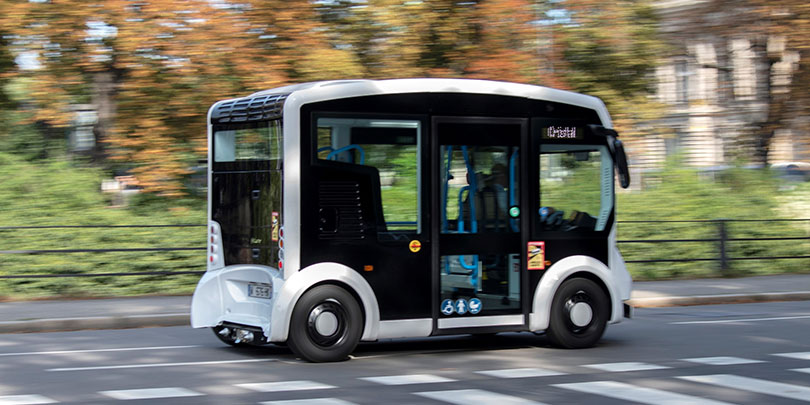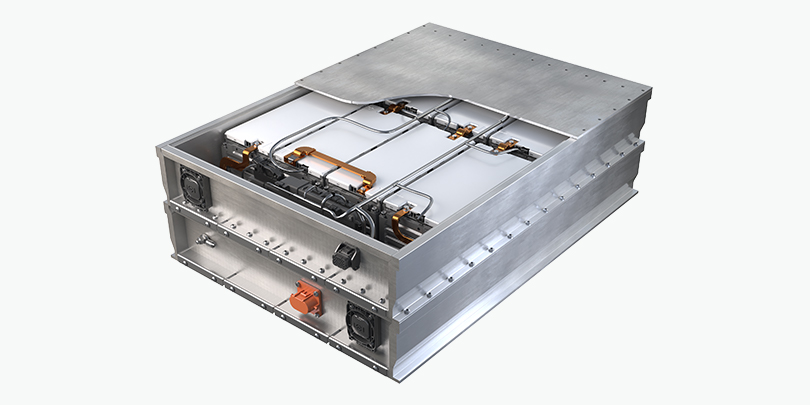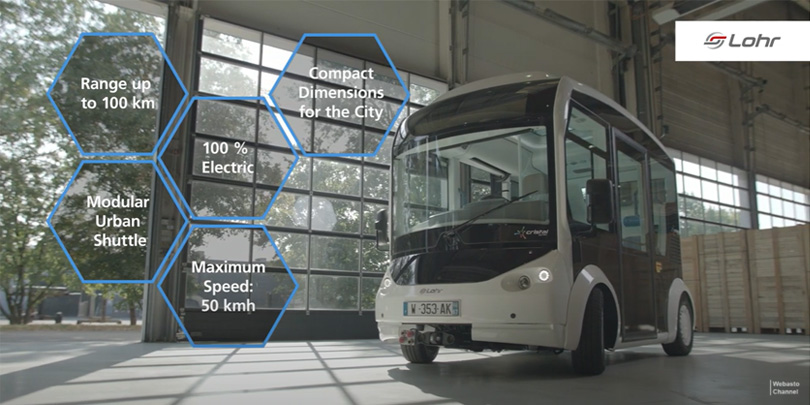Lohr relies on battery systems from Webasto
Starting in October 2021, the French transport company Lohr will launch Cristal, the all-electric modular shuttle system, in four cities in France. The vehicles will be powered by batteries from Webasto, one of the 100 largest suppliers to the automotive industry worldwide.
Lohr is a privately owned Group based near Strasbourg in Alsace, France. For more than 55 years, it has specialized in the development, manufacturing, and marketing of systems for the transportation of goods and passengers, and 80 percent of its revenue comes from exports. With six factories on three continents and 1500 employees, the Lohr Group is a global leader in car-transporter vehicles and a major supporter of sustainable mobility projects. The New Mobilities department was established in 2006 and focuses on electromobility and autonomous driving.

Cristal: electric, eco-friendly and sustainable
Cristal is a modular electric bus system that can be adapted to suit the needs at hand. During rush hour, Cristal is used in shuttle mode, with two to four vehicles coupled together and a professional driver at the wheel. Up to 64 people can be transported at speeds of up to 50 km/h (30 mph) using this mode of transport. The shuttles are easy to uncouple and recouple. This process is automated and takes less than 1 minute – all the driver has to do is press a button on the dashboard. “The idea was to offer operators a flexible and eco-friendly public transport mobility solution, rather than electric buses for maximum capacity,” explains Jean-François Argence, the New Mobilities Director at Lohr.
The pièce de résistance: Cristal can also be used as a vehicle for the first and last mile outside of rush hour or for alternative on-demand traffic solutions. In France, a valid driver’s license is all the driver needs. “Our aim is to achieve maximum modularity so that we can cover all types of inner-city mobility needs,” says Argence.
On the fourth quarter of 2021, around 20 vehicles will be shipped to the cities of Avignon, Orange, Ajaccio, and Saverne and are expected to take to the streets before the end of the year. Lohr is also in close consultation with local government representatives in Germany, with the city of Stralsund, among others.

Batteries from Webasto
When searching for a suitable partner, Lohr soon chose Webasto. After all, the sunroof and parking heater specialist has made a name for itself as a leading systems provider for electromobility within just a few years. One of the most modern production facilities for battery systems – the ultra-flexible multi-product line, which can produce up to 40,000 battery systems a year – is based at the Webasto plant in Schierling.
Customers get the best of both worlds with the standard battery system: On the one hand, they benefit from the low price and high quality of a mass-produced product. On the other hand, they can enjoy the precise fit of a tailored solution. Thanks to the high stability and modular, scalable, and geometric design, the standard battery system is suitable for a broad range of vehicles of all types.
“We know from other business partners that Webasto makes very high-quality products. And it does indeed help that Webasto can offer smaller volumes at an attractive price. We also needed to be very space-saving with Cristal, so the design really suited us,” acknowledges Mr. Argence.
Two batteries with a combined power of 70 kilowatts are used in each vehicle. The range matches the designated route on a day of use. Cristal can manage around 120 kilometers (75 miles) before it needs to be charged. This is either done at a central depot or at certain stops with a power supply on the driver’s route. Cristal is fitted with a fast-charging system that can manage half a charge within 30 minutes and full charge within 90 minutes.
The engineers at Lohr are extremely satisfied not only with the batteries but also the technical support from Webasto, which met their high expectations. Mr. Argence adds: “There is an excellent partnership between our companies. Webasto perfectly understood Lohr’s needs.”

Legal framework established
The biggest challenge for Lohr over the past few years has been the legal framework. As Mr. Argence tells us: “There were no specific regulations for coupled vehicles. In France there was also a ban on transporting people in trailers physically separated from the power-driven vehicle. The relevant legislative adjustments took time and required us to be in contact with the authorities. The regulations were then changed two years ago so that Cristal could be put into operation.”
Over the coming year, Lohr estimates that it will sell 50 to 100 vehicles. The figures are then expected to level off at 200 to 300. An autonomous model, i-Cristal, is also already on standby for the future.
